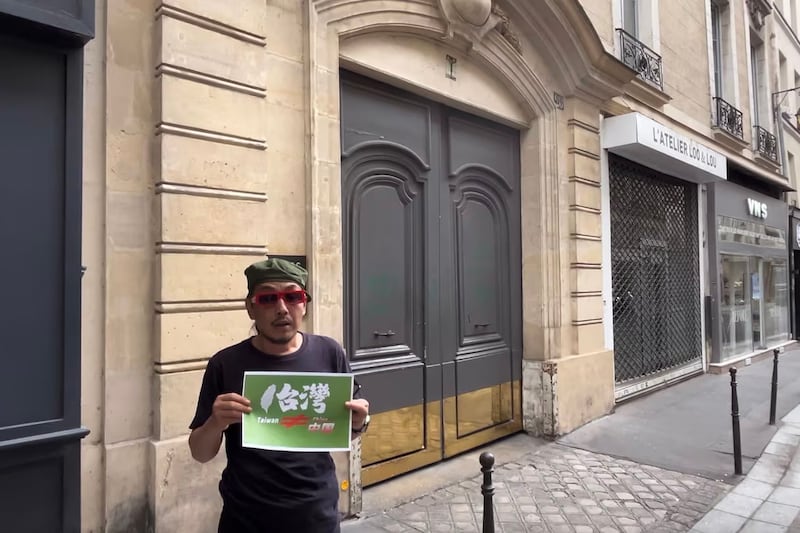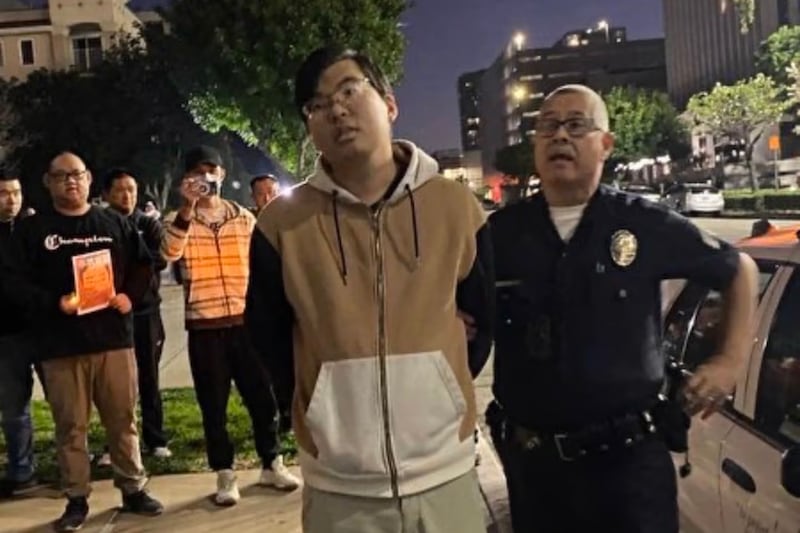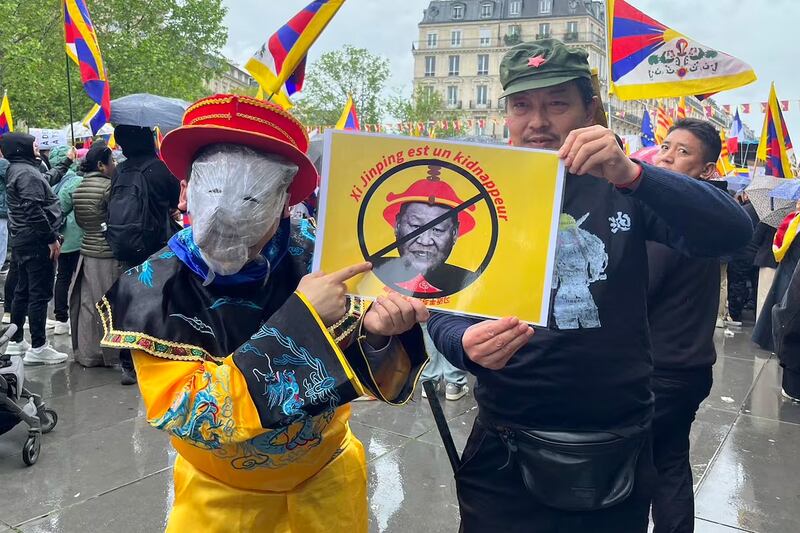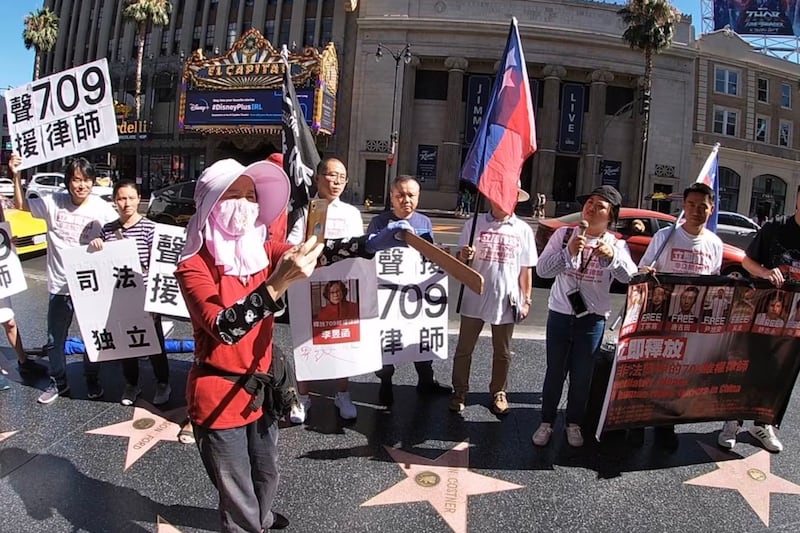Beijing’s “long-arm” enforcement operations continue to target overseas dissidents and rights activists with censorship, harassment and even physical attacks on foreign soil, a France-based citizen journalist and a U.S.-based activist told RFA Mandarin in recent interviews.
Chinese Communist Party agents and supporters have carried out physical attacks and smear attempts on dissidents far beyond its borders, kidnapped them and forced them to return home to face punishment using threats against their loved ones, according to rights groups and personal stories shared with Radio Free Asia.
They also retaliate against anyone who continues to protest against its activities -- even in a foreign country, according to citizen journalist Lin Linqi, who fled to France after he reported on the case of a woman sent to a psychiatric hospital for splashing ink on a poster of President Xi Jinping.
Chinese embassies and consulates frequently bus large numbers of supporters to dissident events and protests, often with the help of overseas Chinese organizations under the aegis of the ruling party’s United Front Work Department, activists have told Radio Free Asia in interviews.
The result is that many Chinese nationals living in France, including asylum-seekers, daren’t show up to protests any more.
Some critics call this network of nationalist supporters outside of China the “love network,” a reference to their patriotic fervor.
“The so-called ‘love network’ has even kidnapped dissidents who apply for political asylum in France and taken them to the airport to be sent back to China,” Lin said, citing photographs that appeared in the French media including Le Monde after an operation at Charles de Gaulle Airport.

Lin’s story is in keeping with earlier reports that Chinese Communist Party agents and supporters have carried out physical attacks and smear attempts on dissidents far beyond its borders, kidnapped them and forced them to return home to face punishment using threats against their loved ones.
The French government expelled two Chinese diplomats and repatriated an organizer from the “love network,” Lin said, citing French media reports.
Chinese diplomatic missions also cultivate and support specific France-based, Chinese-owned businesses known to be loyal to Beijing, many of which are run by businesspeople from the eastern city of Wenzhou, Lin said.
“Former Chinese Ambassador to France Lu Shaye and other officials often interact with this ‘love network,’ which is kind of equivalent to the Chaoyang aunties [citizen volunteers] in Beijing,” Lin told RFA Mandarin in a recent interview. “On the surface, they do charity activities and volunteer.”
“For example, when the Chinese government was handing out vaccines, [traditional Chinese COVID-19 treatment] Lianhua Qingwen, masks and protective clothing in Cambodia, France and other places, the embassy organized the local love network and local [Chinese] chambers of commerce to buy them too, rewarding them in other ways.”
“These organizations were able to accomplish what the Chinese consulate couldn’t.”
RELATED STORIES
China Uses ‘Friendship Associations’ to Extend Influence Among Overseas Elites: Report
Chinese calls for Taiwan hotel boycott part of propaganda machine
EXPLAINED: What is China’s United Front and how does it operate?
The rewards could take the form of contracts to provide services like tour group management, interpreting or notarization of documents for visa applications, he said.
“If a Chinese tour group visits, they will be sent to certain hotels and restaurants approved by the embassy, forming a network of interests,” he said.

Last year, when a group of Chinese influencers went to the Taiwanese-owned Evergreen Hotel in Paris to protest against the lack of a Chinese national flag in its display, Lin went along to support the hotel.
He said the protests were organized by the France-based Association for the Promotion of Peaceful National Reunification, a United Front organization with branches in many countries.
“After the bullying by online celebrities, the National Association for China’s Peaceful Unification in France organized a reception for the celebrities hosted by around 50 Chinese chambers of commerce in Paris,” Lin said.
The State Department has said these associations are quasi-government organizations tasked with “co-opting and neutralizing threats to the party’s rule and spreading its influence and propaganda overseas.”
It designated the Associations as Chinese foreign missions in 2020.
“They held a meeting to collect signatures in support of the collective bullying of Taiwan’s Evergreen Hotels, which went on for more than 10 days,” Lin said of the Evergreen campaign.

He said the president of the Association hails from Wenzhou, and the Chinese Embassy often holds meetings, conferences and New Year receptions at his hotel.
Meanwhile, U.S.-based dissident Jie Lijian, said the Chinese government also promotes the consumption of state media by handing out heavily discounted cards and set-top boxes that allow people to receive heavily censored and propaganda-packed state TV channels including CCTV, Hainan TV, Guangzhou TV and Phoenix.
“For example, if you sign up to pay US$30-50 US dollars a month, you will get 6 months free, or if you pay 3 months, you will get 1 year free,” Jie told RFA Mandarin. “How do they make money? Who provides you with the service? How is the money used?”
“They can’t make a profit,” he said. “You have to pay US$60-70 a month for American channels, and they have to run the cables and install them.”
“Without massive financial backing behind them, these companies would have been in the red a long time ago.”
The set-top boxes often include monitoring capabilities, Jie said.
“There are monitoring functions, recording functions, and they can secretly record video, so you have no privacy in your own home,” he said. “It is very likely to steal your information, and there’s no privacy, which is kind of like an invasion.”
Since Chen Yixin took over as Minister for State Security in 2022, a plethora of pro-Beijing “news” channels have sprung up overseas, attacking the banned Falun Gong spiritual movement and anyone who opposes Beijing, Jie said.

Pro-China supporters also interfere with the activities of pro-democracy groups, including a screening of a documentary film about the rebel Guangdong village of Wukan that was shut down at the last minute after the proprietor got cold feet.
“More than 100 people went there that afternoon, and the food and drink cost US$60 a head, so there would have turned over at least US$6,000,” Jie said. “But suddenly the proprietor shut up shop, saying he was scared after being contacted by ‘the relevant departments’.”
“That was a lot of business, so there must have been a lot of power at work behind the scenes,” he said.
Translated by Luisetta Mudie. Edited by Malcolm Foster.
